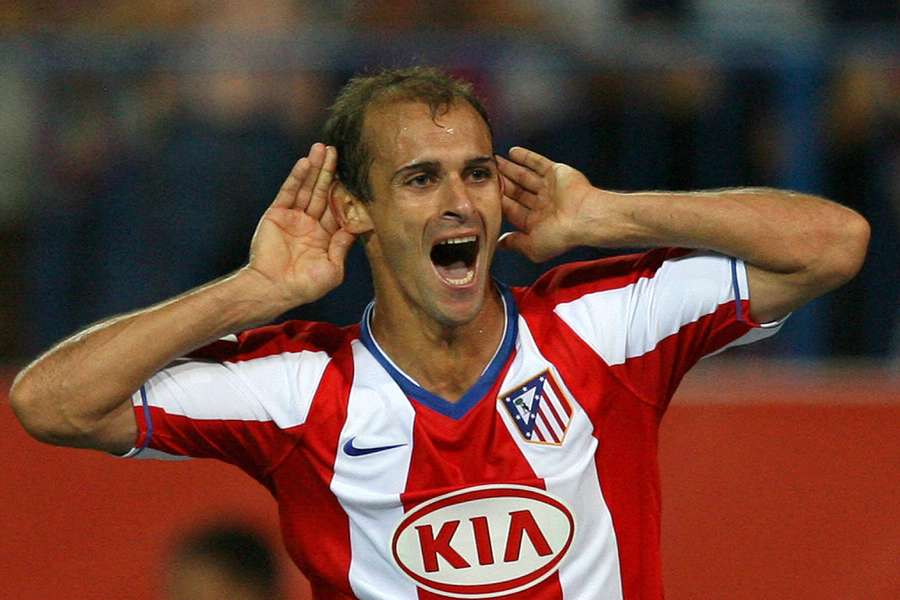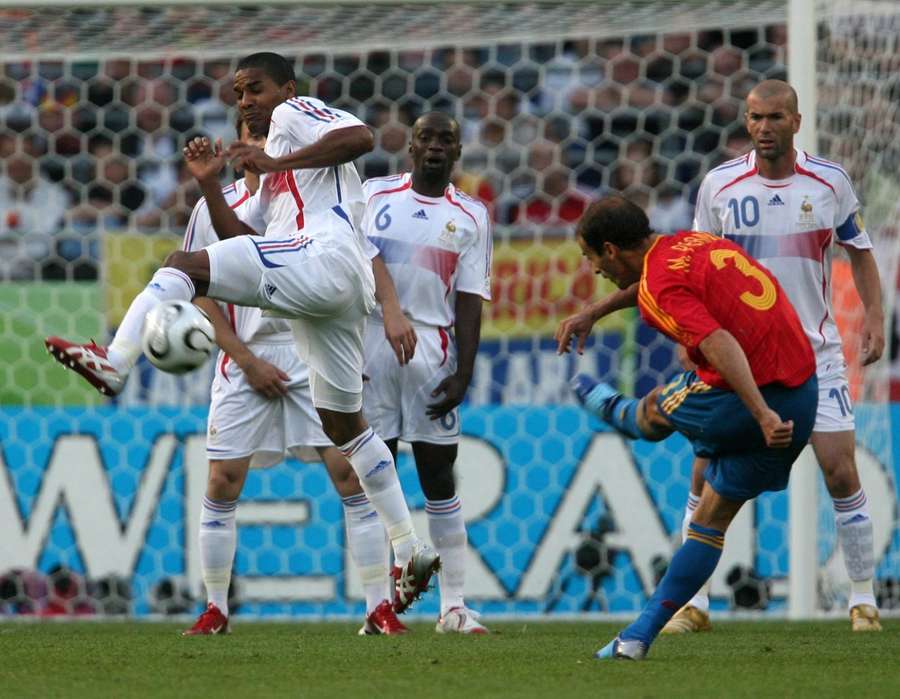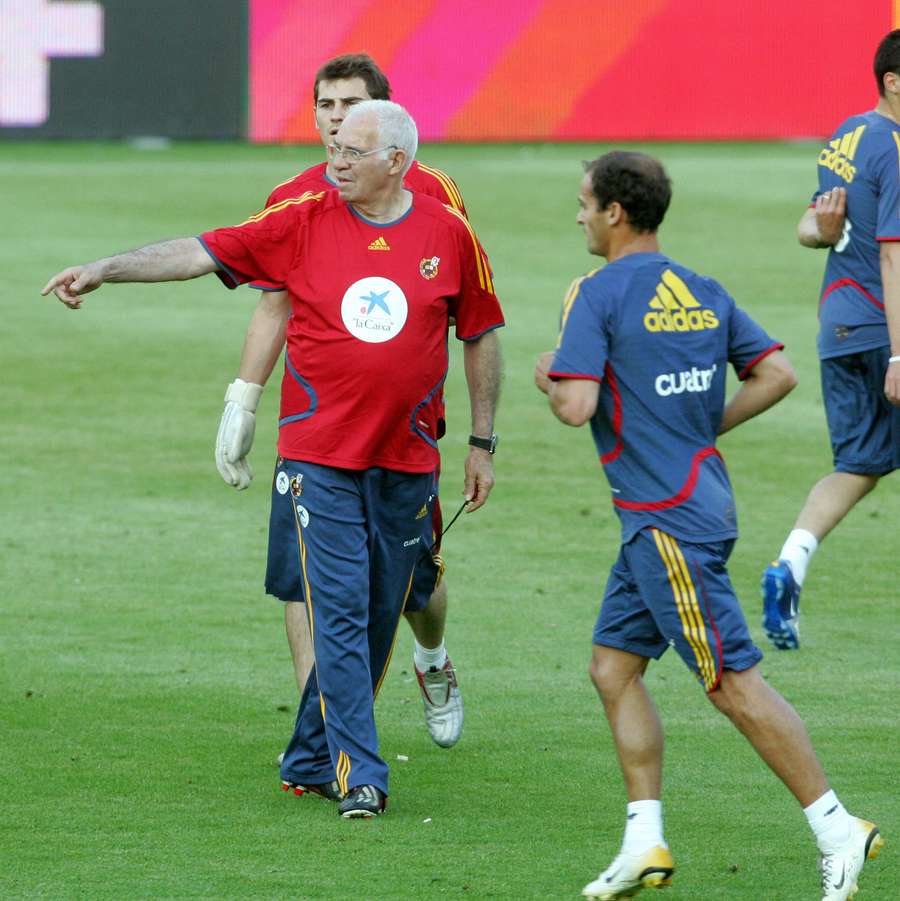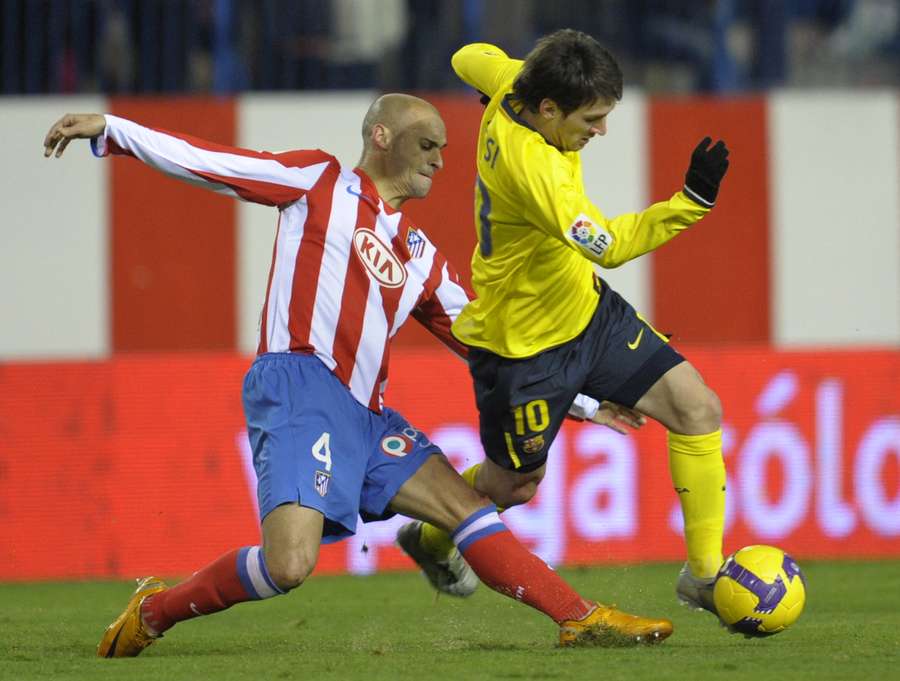EXCLUSIVE: 'If Messi had chosen Spain he would already have two World Cups,' admits Pernia

His arrival in Spain, his passion for motor racing, Messi and Argentina, life after football... Mariano Pernia leaves no question unanswered and proves that he is a man in love with life and the beautiful game. During almost half an hour of conversation we were able to meet a man who now dreams of becoming a coach and follow in the footsteps of Luis Aragones. An unmissable conversation with someone destined to find happiness in what he does.
Question: How did you make the switch from football to motor racing?
Pernia: "It's an inheritance. My father did the same thing. He was a professional footballer, played for Boca and the Argentine national team. After that, he started racing cars and we grew up with my father in the races. We lived it from a very young age and we love it. In fact, my brother, while I was playing football, also raced cars and, to this day, he races and he is one of the best here in Argentina.
"Motor racing in Argentina is the second sport. It's like motorbikes in Spain, they are very popular."
How did you come to play in Spain in the early 2000s?
"We were champions here with Independiente and I went to Recreativo de Huelva (Recre), a very, very modest team in the Primera Division, in the winter market. Almost half the season had gone by and they only had nine points, but when the opportunity came up they let me know and I didn't hesitate for a moment. I always dreamed of making the leap to Europe and, at that time, the Spanish league was without doubt the strongest. The English league was starting to be strong and Spain and Italy were there. At least in Argentina, the Italian and Spanish leagues were seen above the others, because a lot of Argentinians went to both."
In the 2005/06 season you scored 10 goals playing as a defender, what did you do to reach that level?
"With Recre we finished in the second division and after a year and a half I got the opportunity to go to Getafe. I didn't hesitate either, because I was in Madrid and it was to return to the Primera Division. It was a huge showcase. Always, the teams that are in the capital and in the big cities, together with teams like Atletico Madrid and Real Madrid, or Barcelona and Espanyol in Barcelona, are more of a showcase, because people go to see matches (of the big teams) and at the same time they go to see the team of the zone. I didn't hesitate either and it all came together.
"They were very good seasons, because I was already established, with a year and a half of experience getting to know the league, at 27 years old, which is the best age for a footballer because physically you are still as good as 20 or better, and with experience, with a lot of games under my belt. On a personal level, my first child had been born and I was also very strong emotionally. All of that came together with a great team. We had a great team those two seasons, we did really well, and for me personally I got everything right."
The doors to the World Cup in Germany opened for you, did you expect to play in the World Cup with Spain when he arrived at Recre in 2003?
"Not at all! I don't set myself very long term objectives, because if you don't achieve them you can get upset. So, I set myself very achievable goals: to make my debut in the First Division, then to be able to sustain myself, once in the First Division, and then, more firmly, to try to win a championship as a group. I achieved everything.
"I did want to make the leap to Europe, like all footballers in Argentina, but not at that moment when I was given the opportunity. It was a goal that I didn't have in my plans right away, but it happened. Once there, it was a new beginning.
"As for the national team, I think that, unless you are a very outstanding player since you are very young, you depend a lot on the level you have in the team. The national team doesn't come because you have the opportunity to go because they buy you, the players who stand out for a couple of years in a team go to the national team and the possibility opens up for them. When I started to stand out in Getafe, I had already started the nationality process and I got it just a few days before the definitive list for the World Cup."
What was your experience at the World Cup?
"The World Cup was amazing. What I experienced there was unforgettable. From the moment I arrived, you arrive with a lot of doubts because you are a foreigner and you don't know how the squad is going to react, but I was lucky enough to find an incredible squad where the majority, 80% of the squad, were kids who were just starting out in their careers. There was Iniesta, Xavi, Puyol himself was 24 or 25 I think. Then Iniesta was 21, Fabregas was 18?
"It was a very young team and when my brother asked me what we were there for, I told him that we could definitely win the World Cup. The only doubt I had was when the decisive moment of the World Cup came, which was from the round of 16 or quarter-finals onwards, when experienced teams make the difference. And it was just like that: we got through the first round very easily, playing very well, and when we were caught by France, who had been bad in the first round... That France had a lot of experience, beyond all the quality they had. They ended up reaching the final and losing to Italy.
"It's clear that World Cups are defined by the details. And in the details, often with experience, you have an advantage."

After the World Cup, comes Atleti...
"2006 is a year in the calendar that I have marked with a fluorescent colour, because everything happened. There was the World Cup and, before the World Cup, I had already signed with Atletico Madrid in March 2006. I finished that season with Getafe and in June I had to join Atletico Madrid.
"It was spectacular. They were four unforgettable years. It's true that I arrived at an Atlético de Madrid that was nowhere near what it is today in terms of results and organisation. It came from years in which they had recently been promoted from the second division to the first division, they hadn't been in European competitions for 11 years and they are a big club in Europe. I remember that first chat with Miguel Angel Gil, who told me: 'my idea is to compete in Europe again'.
"He didn't talk to me about championships, he told me that his idea was to put together a squad to compete in Europe again and, as the years go by competing in Europe, you obviously earn more money and there will be fewer changes of players. At that time at Atletico de Madrid I remember that they changed 12 players, 15 players season by season and that disorder doesn't give you stability.
"They made it. Already the first year we qualified for the Europa League and the other three years we qualified for the Champions League. It's clear that Miguel Angel's strategic plan paid off, because today Atlético de Madrid is what it is thanks to the strong foundations he laid at the start of his management of the club."
You were coached by Luis Aragones, what memories do you have of him?
"Of Luis, the best. He's a bit of a reference point for me. I did the coaching course and soon I would like to start coaching. I think I would base myself a lot on how he managed the groups and his way of seeing everything, not just the football part. I think that to be a coach you have to achieve what he achieved: befriend the player without the player getting confused that he is the coach. Every decision Luis made, there was no one in the group of players who thought it wasn't the right one for that particular game.
"There were changes from one game to the next and no one would say, 'Hey! But I played well, I don't know why he took me out of the team'. If Luis made a decision, he managed to make sure that no one argued with him and that we were all happy, even those who didn't play. Very few coaches do that."
Did he transmit the respect of someone who has been great as a player?
"He made you respect him a lot. He was super professional, nobody made a joke. But he would finish training and the first one to make a joke or to be laughing with the players was him. It was a terrible atmosphere, spectacular."

Griezmann can beat you as the top scorer in the history of Atletico...
"He will beat me, because he still has a long career ahead of him and he will beat me. That will mean that Atletico Madrid have scored a goal and, with 'Cholo's' teams, we know that it's difficult for them to concede goals and we'll probably win 1-0."
Against Getafe it was difficult...
"Yes, I saw it. It was a special game. Strange, strange with the expulsion (of Savic). Still, the result was a bit of a lie even though Atletico were winning comfortably. Getafe had had their chances too."
You always say that Messi drove you crazy in 2009 in the Copa del Rey. So it was already clear that the World Cup was coming for him?
"Look! It's a team sport, so it wasn't so clear that the World Cup would come. If it was for personal merit it should have come at the first World Cup he played in or the second. But he has had to wait a lot. He has lost finals without having anything to do with it. When you lose on penalties, maybe he takes it and a teammate misses it.
"I had no doubt that Leo was going to be everything he was, because apart from that I knew him, not a lot, but some, personally and I knew about his mental strength. He is a person with a terrible mental strength who never stops wanting to grow and want to learn, despite the fact that from the outside, apparently, he seems to know everything. He got better and better year by year.
"In the beginning you could see that, at times, it was a bit difficult for him to define because he kicked hard and then, the following year, he started to place it on the side and he was already a goal scorer, as well as an assisting player.
"Two or three years later he started to take free kicks, which he didn't take. He kept adding things, he never relaxed at any time knowing that he was the best in the world. That's how he became what he is today: the best in history."
It's a good thing he won the World Cup... In Argentina, Leo has been targeted a lot throughout his career, hasn't he?
"Here in Argentina there was a time when we didn't deserve to have Messi in the Argentina shirt because he was criticised a lot. They even asked him not to go to the World Cup. After the World Cup, which was lost on penalties, they asked for Messi not to go again and it was crazy. I used to say to everyone here, 'if Messi had chosen to play for Spain he would already have two World Cups'.
"Undoubtedly, the one Spain won (2010) with Messi would have won it too and the next one would have won it too, because Messi was at his best. That was my reading: if Messi had chosen to play for Spain, he would have won two World Cups in his early days.
"It seemed crazy to me what he was going through here, but we come back to the same thing: with his head and his personality he turned the situation around. Today, I would say that if he ran for president he would win 100%."

How did motor racing help you when you left football?
"It helped me a lot. What I would have missed a lot, and I miss a lot, is racing. In football, you compete first to win a game on Sunday and then on Sunday to beat your opponent. There is a continuous competition. You go to bed thinking that tomorrow you have to do well to be able to play on Sunday. Then, the day before the game you're focused on doing well to try to beat the opposition. You are active 24 hours a day with that internal thoughts.
"Motor racing keeps me quite busy, although it's more relaxed because you only have one race a month. But it keeps you active to compete, to have the desire to get up and train for the ultimate goal, which is the race."
Your brother won the TC 2000 championship, you won for teams and brands. You can say that the family business is going well?
"Yes, it's going well, it's going well... (laughing) We are champions of everything! My brother in the drivers' category and then the team and brands, we won all three championships. And then we shared several podiums together. It was a very special year."
For those of us who are not so used to it, how does the championship work in Argentina?
"Like Formula 1. Although the cars have nothing to do with each other, they are cars with roofs, like rally cars, but we race on track. The championships are 12 races a year in which you are given points according to the position you came out of the competition, and at the end of the year the one with the most points is the champion. There is only one point in the regulations that says that to become champion you have to have won one race out of 12."
You recently won the senior league with Tiger?
"Yes, the Senior 35+!"
In a way you're still competing in football?
"I'd say I play more than when I was playing professionally, because I'm in four different teams and there are weeks when I have a lot of games. I've played five games out of seven days. I love being on a football pitch. Obviously if the level is better, even better, but I don't mind if it's football between friends to have a good time and have fun. I'm really enjoying being on a football pitch without the pressure of having to win or win.
"The other day, the final we played against Tigre was a final that reminded me a lot of the old times because it was played with half of the stadium full, with the fans, with flags... I experienced a unique moment that I thought I would never experience again."
How does it feel to enter a stadium full of people?
"The other day I experienced it again, as I said. I had forgotten a little bit what it felt like. It's terrible nerves. That little bug in your stomach. You have to do well, because all those people are watching you, demanding that you do well. It's a bigger pressure than going out to play with friends, obviously. That's why there are players who have a lot of ability, but under that pressure they don't perform. It's not easy at all.
"It was a match where we had a warm-up before going out onto the pitch all together in the dressing room, which we almost never do. The welcome from the Tigres fans was spectacular. Going out onto a pitch like that, with so many people, is unique. I think that for all of us who get to play football professionally, it's what ends up motivating us to always be at our best. It's what you miss when you leave, when you leave."
If you were to start again, what would you choose, football or cars?
"Football (he answers emphatically before the question is finished) Football, without a doubt. I love motor racing. It's a passion too, but I feel much more confident on a football pitch than in a racing car."
